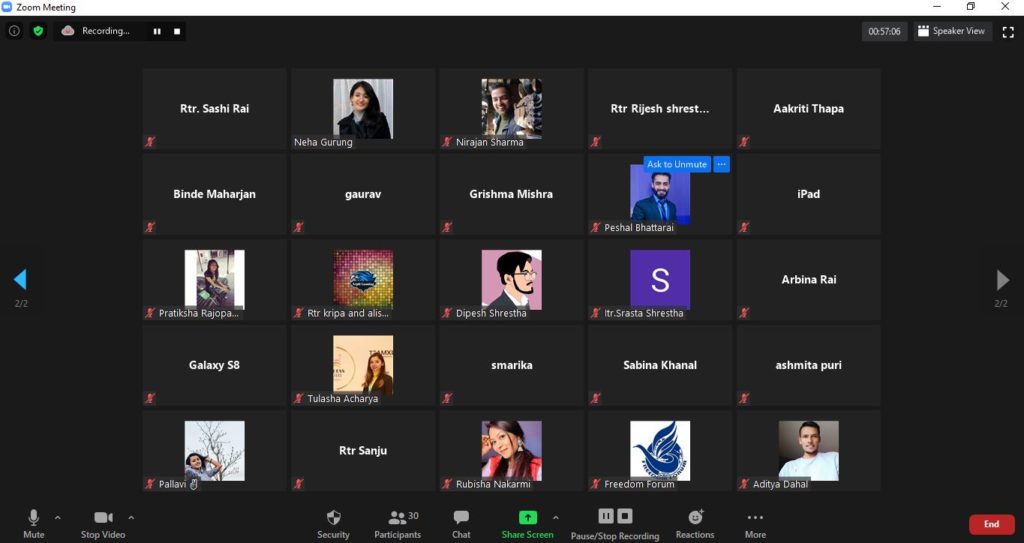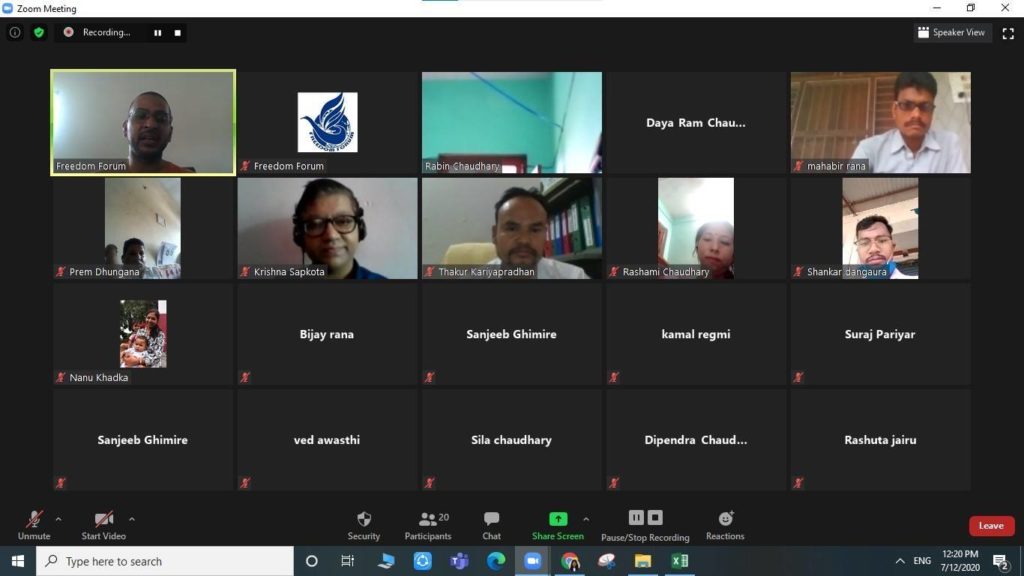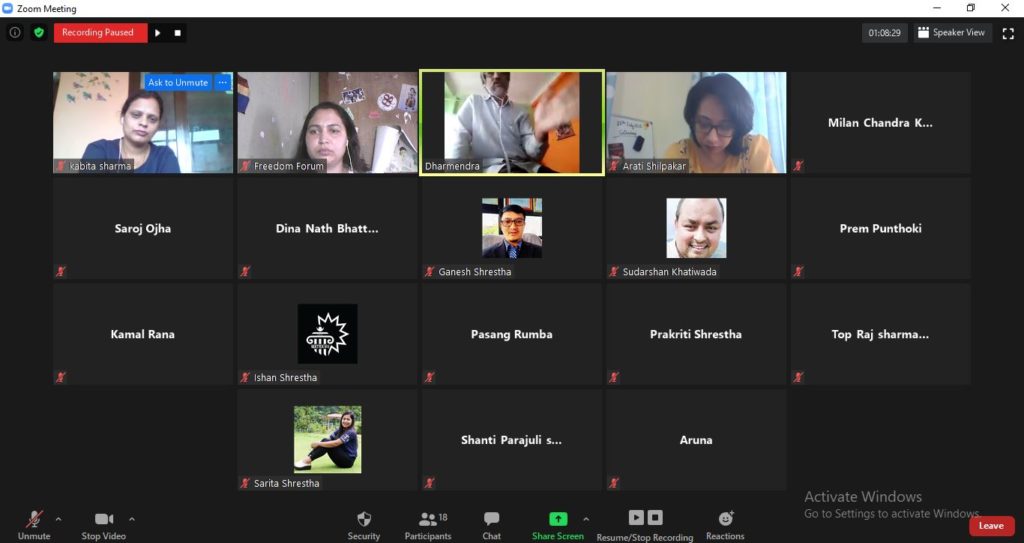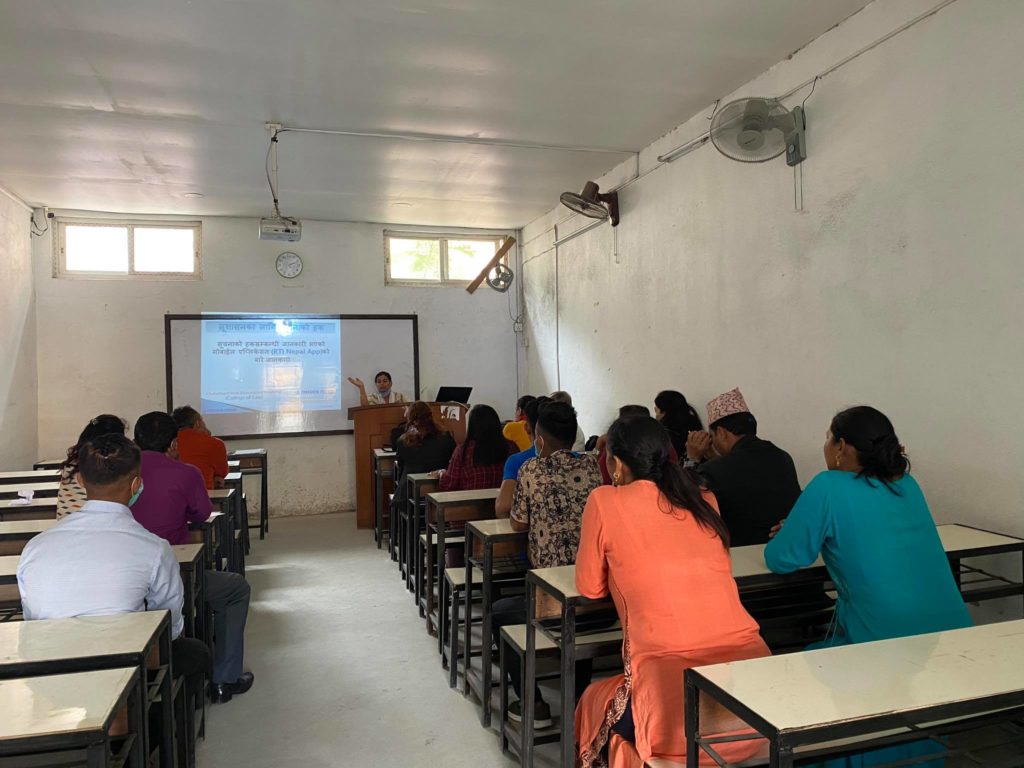Freedom Forum has been conducting orientations among youth, women and various groups on Right to Information and RTI Nepal App as a campaign to promote use of RTI for good governance all over Nepal.
Starting from June, FF has already conducted eleven orientations till date in Bagmati, Gandaki, Karnali and Far-west Provinces.
At a time when people’s movement is limited across the country with the COVID-19 pandemic, FF organized the Zoom meeting, thereby reaching the targeted groups for the promotion of RTI App Nepal.
ON July 5, the Zoom meeting entitled- ‘Know your right to information’ was organized in coordination with Rotaract Club of Kathmandu Metropolis. The program had the participation of 33 youths- 10 male and 23 females.

The program began with a presentation on fundamentals of right to information and procedures to demand information through the App which can be downloaded in Android Smartphones. At the program moderated by Dikchya Raut, one of the participants and RTI activist Aditya Dahal shared his experience of seeking information on expenses incurred during COVID19 response at a municipality office.
Program coordinator Sanju Dangol shared that knowing about RTI Nepal App,a first app on RTI in Nepal, the participants expressed happiness that they were now aware of it and would follow the formats, forms and procedures to receive information in future.
In the program, RTI expert and legal practitioner Sanjeeb Ghimire provided additional information on RTI, its legal provisions and also answered queries raised from the floor.
On July 12, similar orientation was held among 13 male and 5 female participants representing civil society, local government, teachers, youth and RTI activists from Kailai district of Far-West Province. Expert Ghimire highlighted upon the legal provisions of RTI and its use in Nepal focusing more on existing confusions on its practical use in the program.

Moreover, policy advisor Krishna Sapkota pointed out the RTI being one of the major components of open government also contributes to making transparent and accountable government.
During the program, some participants shared their experience and difficulties they faced while using RTI. They also suggested inviting citizens along with local level authorities at such programs to ensure free access to information among general public.
They also said that the program was relevant, very useful and that they could easily seek information with the help of application formats available in the app.
Local coordinator Thakur Prasad Kariyapradhan facilitated the program while Pramod Bhattarai presented principles of RTI, related act, and its practical application through RTI Nepal App. The program was also held through Zoom application.
Similarly, next program was conducted on July 10 in Bajhang district of Far-West Province gathering 4 males and 16 females representing civil society, youth and RTI activists. Representative Dambar Sunar facilitated the program while Bhattarai from FF provided orientation on theoretical and practical aspects of RTI and RTI Nepal App.
At the program, participants shared their experience while exercising RTI at public agencies. One of the participants shared that a community school which was reluctant to provide information before responded within two days after filing application using RTI. He had demanded information regarding student’s scholarship scheme.
FF’s General Secretary and Senior RTI activist Dharmendra Jha discussed how RTI evolved worldwide, its basic concepts and importance at citizens’ level.

Similarly, in a separate orientation held among media technology post-graduate students in federal capital Kathmandu on July 18, Jha explained that importance of RTI is to expose existing irregularities. He also stated present challenges on retrieving information from local authorities and making local citizens aware about their right to information.
During the program, one of the students Kabita Sharma shared difficulties she had to receive copy of her answer sheet using RTI at examination board. All the participants being media professionals expressed thanks to FF for building such informative and understandable App with facility of sharing questions through the App. The program was held via zoom. It was attended by 10 males and five females.
Again, at an orientation held on July 9 in Karnali Province, Chairperson of Karnali Foundation, Narayan Bhattarai, presented introduction, principles of RTI and its application through the App. Total 28 participants (17 male and 11 female) including journalists, civil society representatives, teachers and law students from different districts of the province attended the program.
Coordinator Khagendra Bhattarai had moderated the Zoom program where participants especially journalists and students expressed commitment to use RTI through the app to contribute to creating informed citizenry for good governance. The participants also described RTI as an effective tool to expose corruption and develop information culture helps build responsible and accountable public authorities.

The campaign further continued among 22 students and tutors of a law college in Kathmandu. FF’s Secretary and Advocate Ram Maya Lamichhane provided orientation, maintaining physical distance among the participants on July 10. At the program, Lamichhane discussed RTI Act, its principles, practices and success stories in Nepal whereas, Pramod Bhattarai described the App and its use.
The participants were eager to learn more about process to appeal at National Information Commission after the first information request is denied from concerned authority and they also urged for the need to bolster NIC’s function to promote use of RTI.
Again, on July 12, Lamichhane conducted an orientation among local representatives, community school representatives and citizens of Suryabinayak Municipality of Bhaktapur district. Along with Lamichhane, Aditya Dahal from FF moderated the program providing information on the App and its contents. The orientation was attended by 26 male and 5 female participants.
In the program, Ward Chair Kiran Thapa said though the program was short, it was informative and useful for ward members as well as citizens for building good governance. He further informed the participants to read a book published by the municipality about its program and policies.
——-


